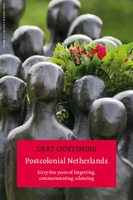Postcolonial Netherlands
Sixty-five Years of Forgetting, Commemorating, Silencing
Author(s)
Oostindie, Gert
Collection
Dutch Research Council (NWO)Language
EnglishAbstract
The Netherlands is home to one million citizens with roots in the former colonies Indonesia, Suriname and the Antilles. Entitlement to Dutch citizenship, pre-migration acculturation in Dutch language and culture as well as a strong rhetorical argument (‘We are here because you were there’) were strong assets of the first generation. This ‘postcolonial bonus’ indeed facilitated their integration. In the process, the initial distance to mainstream Dutch culture diminished. Postwar Dutch society went through serious transformations. Its once lilywhite population now includes two million non-Western migrants and the past decade witnessed heated debates about multiculturalism. The most important debates about the postcolonial migrant communities centered on acknowledgement and the inclusion of colonialism and its legacies in the national memorial culture. This resulted in state-sponsored gestures, ranging from financial compensation to monuments. The ensemble of such gestures reflect a guilt-ridden and inconsistent attempt to ‘do justice’ to the colonial past and to Dutch citizens with colonial roots. Postcolonial Netherlands is the first scholarly monograph to address these themes in an internationally comparative framework. Upon its publication in the Netherlands (2010) the book elicited much praise, but also serious objections to some of the author’s theses, such as his prediction about the diminishing relevance of postcolonial roots. Nederland telt ruim een miljoen burgers met wortels in de voormalige koloniën, Indonesië, Suriname en de Antillen. Juridisch staatsburgerschap, voorgaande bekendheid met de Nederlandse taal en cultuur en een sterk retorisch argument (‘Wij zijn hier omdat jullie daar waren’) gaven deze migranten een vergelijkenderwijs sterke uitgangspositie. Deze ‘postkoloniale bonus’ bevorderde de integratie, waarbij gaandeweg de verschillen tussen deze gemeenschappen en de bredere samenleving afnamen. Gelijktijdig veranderde die samenleving sterk. In 1945 had Nederland een roomblanke bevolking, vandaag telt twee miljoen niet-westerse migranten en worden heftige debatten gevoerd over multiculturalisme. De belangrijkste ideologische debatten van de afgelopen decennia rond de postkoloniale gemeenschap draaiden om erkenning en het opnemen in de nationale herdenkingscultuur van het kolonialisme en zijn erfenissen. Dit leidde tot een reeks officiële gebaren, variërend van financiële compensatie tot monumenten, waarin op schuldbewuste en vaak weinig consistente wijze ‘recht wordt gedaan’ aan het koloniale verleden en aan de afstammelingen van de koloniale onderdanen. Postcolonial Netherlands is het eerste boek dat deze thematiek systematisch behandeld en in vergelijkend perspectief plaatst. Het boek werd bij publicatie in Nederland (2010) overwegend positief ontvangen, al riepen de uitgesproken stellingen van de auteur over ‘het einde van de postkoloniale geschiedenis’ heftige tegenspraak op.
Keywords
citizenship; geschiedenis; postcolonialism; history; postkolonialisme; burgerschap; citizenship; geschiedenis; postcolonialism; history; postkolonialisme; burgerschap; Dutch language; Dutch people; Indonesia; Maluku Islands; Netherlands; Netherlands Antilles; SurinameDOI
10.5117/9789089643537ISBN
9789089643537OCN
755719517Publisher
Amsterdam University PressPublisher website
https://www.aup.nl/Publication date and place
2011Classification
National liberation and independence


 Download
Download